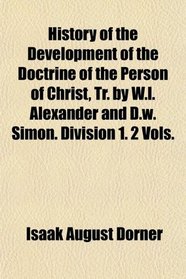Search -
History of the Development of the Doctrine of the Person of Christ, Tr. by W.l. Alexander and D.w. Simon. Division 1. 2 Vols.
History of the Development of the Doctrine of the Person of Christ Tr by Wl Alexander and Dw Simon Division 1 2 Vols
Author:
General Books publication date: 2009 Original publication date: 1863 Notes: This is a black and white OCR reprint of the original. It has no illustrations and there may be typos or missing text. When you buy the General Books edition of this book you get free trial access to Million-Books.com where you can select from more than a million book... more »
Author:
General Books publication date: 2009 Original publication date: 1863 Notes: This is a black and white OCR reprint of the original. It has no illustrations and there may be typos or missing text. When you buy the General Books edition of this book you get free trial access to Million-Books.com where you can select from more than a million book... more »
ISBN-13: 9781150350245
ISBN-10: 1150350245
Publication Date: 12/22/2009
Pages: 434
Rating: ?
ISBN-10: 1150350245
Publication Date: 12/22/2009
Pages: 434
Rating: ?
0 stars, based on 0 rating




